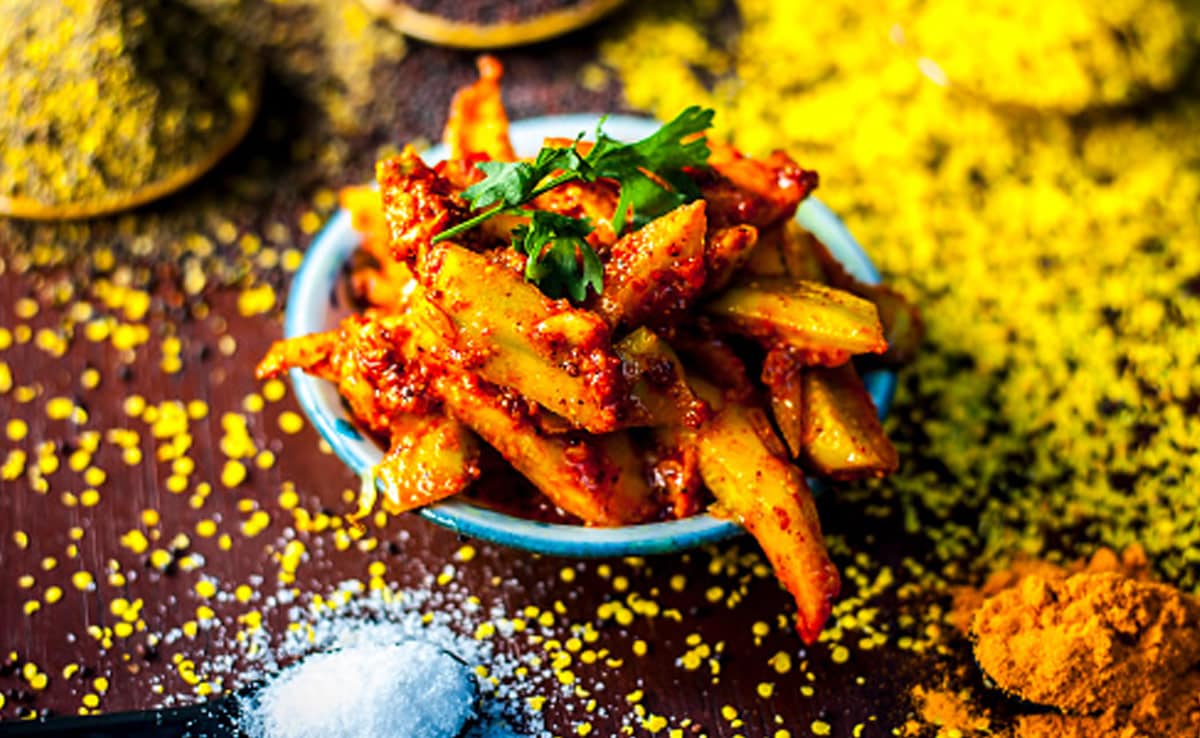
In India, every kitchen has a dedicated space in the pantry to store achar (or pickle). We have it with roti, paratha, rice, sabzi, and bread as well. It won't be an exaggeration to say that achar is one of the most consumed, and possibly the most underrated, food items in a desi meal. It is spicy, packed with flavours, and adds that zing to your palate every single time. But what makes it even more special is the cultural and health significance associated with the food. In this article, we will share certain insights on achar that will make you fall for it all over again. Let's take you through.
Also Read: Running Out Of Pickle? Make This Instant Nimbu Achar And Relish
Why Do Indians Love Achar? What Makes Pickle A Part Of Your Daily Diet?
According to the blog The Pickle Story, the term achar is believed to have a Persian origin, which refers to preserving powdered or salted meats, roots, leaves, vegetables, or fruits, using salt, vinegar, honey, or syrup. On the other hand, the term pickle is said to have its roots in the Dutch word 'pekel', meaning saline or brine. In India, you will find different varieties of achar in every region and sub-region, making it a rich and significant addition to the Indian food map.
Cultural Significance Of Achar (Pickle):
Have you ever experienced different tastes of the same food in different households? You surely have! It is because every kitchen has its secret technique, masala concoction, and cooking styles, passed on through generations. It stands true for pickles as well. The art of pickling in India is more of a tradition that takes us down the memory lane where our mothers and grandmothers used salt, spice, and oil to preserve several fruits and veggies, under sunlight.
As per Indianculture.com, initially, pickles were just preserved foods, made using basic ingredients like salt and oil. But over time, the art of pickling in India evolved, with influences of factors including region, climate, availability of ingredients, and most importantly, the palate of the locals. This is why a jar of achar, today, plays a major role in defining the food culture of a region or a household.
Also Read: Don't Want To Waste Pickle Oil? 5 Easy Ways To Reuse It To Perfection

Photo Credit: iStock
Social Significance Of Achar (Pickle):
The country boasts a range of seasonal produce that helps define our overall food habits. But regrettably, the diet pattern changes at regular intervals - for instance, we enjoy mangoes just during the summer and fresh carrots only in the winter season. What if we say we have a technique to preserve our favorite produce to enjoy year-round? No point in guessing, we are talking about the art of pickling. Be it raw mangoes or shalgam, we preserve various types of fruits and vegetables in the form of pickles to enjoy them year-round. The process of preservation not only extends the shelf life of an ingredient but also helps reduce food wastage, impacting the overall society significantly.
Nutritional Significance Of Achar (Pickle):
According to Ayurveda, the art of pickling helps grow healthy microbes in a food ingredient, making it healthier for you. Nutritionist Rujuta Diwekar weighs in, "Pickles are valuable sources of vitamin K (co-factor in absorbing vitamin D), vitamin A, and probiotic bacteria." She further adds that a little amount of pickle with your daily meal helps provide your body with "the right combo of pre and probiotic", further aiding overall nourishment.
Is It Okay To Have Achar (Pickle) Every Day?
Traditionally, achar is made by preserving fruits and vegetables in salt, oil, and a range of spices. This often makes us doubt whether having it daily can increase sodium levels in the body or toxins in the liver. Fret not, we have found the answer for you. According to macrobiotic nutritionist and health practitioner Shilpa Arora, "Pickle is a traditional way to ferment and eat certain fruits and vegetables throughout the year. This preservation, if done with wholesome ingredients like cold-pressed mustard oil and homemade spices, in the right proportion, makes it healthy for the gut. It is because the process of fermentation generates healthy gut bacteria that reboot the body."
However, she also mentions that there is a limit to the consumption of every type of food. Overindulgence of anything can have a side effect on your overall health. So she mentions that pickles should be eaten in moderation and the ingredients should be selected carefully to make the most of it.
Considering this, we got you some of our favourite homemade pickle recipes to try. Click here to know more.
Track Latest News Live on NDTV.com and get news updates from India and around the world

